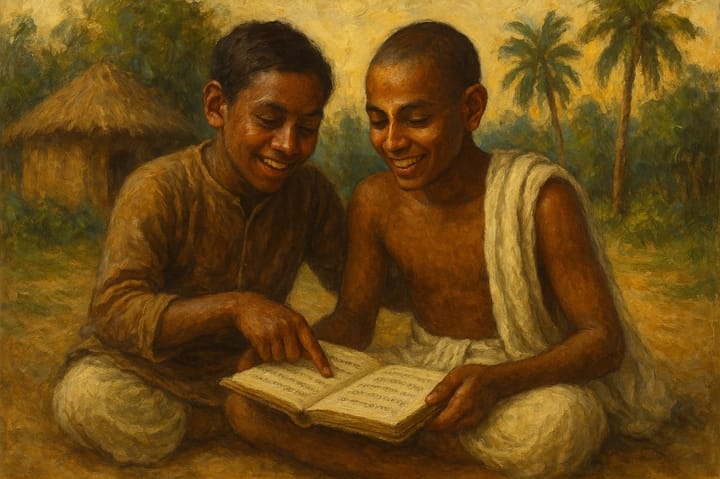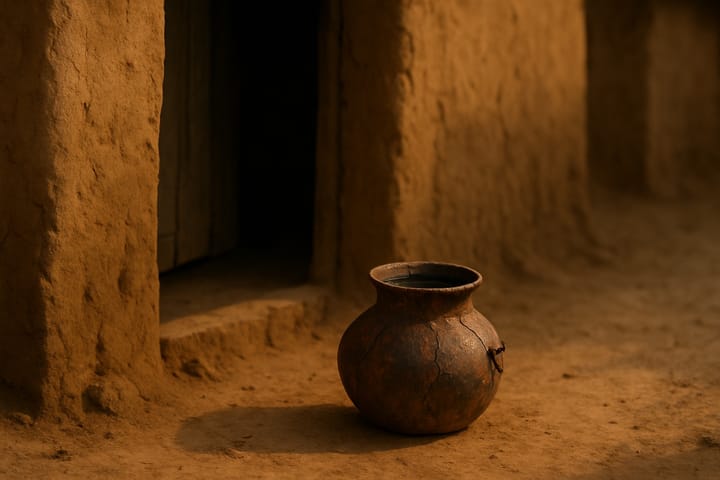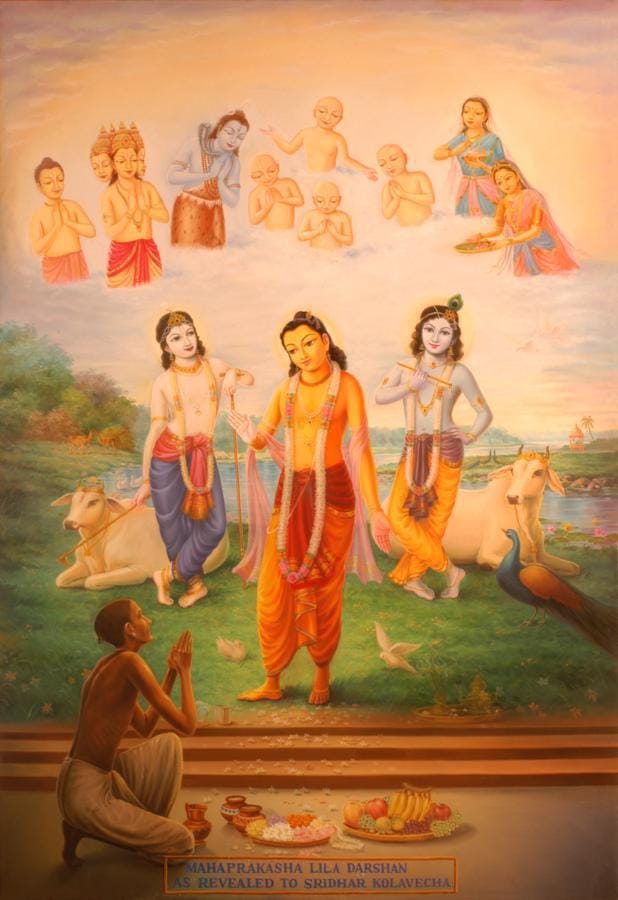Noting Śrīla Gurudeva’s Instructions

In a few days it will be my Śrīla Gurudeva’s Vyāsa-pūjā. On Guru Pūrṇimā, or Vyāsa-pūjā day, he would explain what it means to truly perform guru-pūjā. So in today’s Ekādaśī-eve posting, I will share some quotes on this topic so that my mind will hopefully start contemplating it and I’ll be better prepared to observe this most important day.
Real Guru-pūjā
gorār āmi, gorār āmi’ mukhe bolile nāhi cale
gorār ācār, gorār vicār laile phala phale
Simply saying “I am Gaura’s! I am Gaura’s!” will not do. Only when one adopts Gaura’s conduct and Gaura’s conceptions will the fruit fructify. (Prema-vivarta 8.6)
On Śrīla Gurudeva’s appearance or disappearance days, one may try to exhibit some devotion for him. I’ll want to give a heart-touching glorification, sing a beautiful kirtan and serve the devotees. Somewhere in me, there might be a semblance of sincerity in my attempts to glorify and hear glorifications of him, but in all honesty, being recognized as a good guru-sevaka is at the back of my mind. I can’t help it, the desire flows in my veins—it’s unavoidable. The desire for pratiṣṭhā is so subtle that it’s often impossible for me to even detect it in myself. The only person who can locate and fully remove this cancer of pratiṣṭhā in me is śrī gurudeva. Therefore, on Vyāsa-pūjā day, my Gurudeva would mention that we should not only engage in the festivities and related services, but we must take some time out to seriously contemplate how much we have endeavored to understand śrī gurudeva’s mano’bhīṣṭha (cherished desire) and have endeavored to fulfill it. Otherwise, the day after the festival, it’ll be back to life as usual with no significant change having taken place in our heart, and we will have not actually performed guru-pūjā.
Below are some relevant quotes from my Gurudeva and Śrīla Bhakti Pramoda Purī Gosvāmī Mahārāja.
Although our gurudeva has also entered his unmanifest, eternal pastimes, we happily remain in this world. On the occasion of special days, like his appearance or disappearance day, we might remember him, but often we are involved in arranging the festival in his honour, and there is very little chance to contemplate our separation from him. A tear may come to our eye as we speak something about him; but it may not come. If the festival is very elaborate, there is much to manage, such as the abhiṣeka, guru-pūjā and distribution of mahā-prasādam to the Vaiṣṇavas. Consequently, there is less chance of us finding time to think about him and weep. For the most part, we arrange these festivals for the benefit of the general people who have no intimate connection with him, but on that day we should ensure that a feeling of separation from him enters our own hearts. This is called bhajana.
– Śrīla Bhaktivedānta Nārāyāṇa Gosvāmī Mahārāja
(Rays of The Harmonist – No. 15 Kārtika 2005)
It is essential ... that we understand the true significance of Śrī Vyāsa-pūjā. Merely placing a garland on the neck of śrī guru or offering at his feet a few flowers and fruits, some money, sweets or cloth does not mean that real worship of the guru has been performed. The real Vyāsa-pūjā is to surrender oneself completely at the lotus feet of Śrīla Gurudeva and to fulfil his desires. This means that one should completely offer one’s independence at the lotus feet of śrī guru in the mood of surrender: “O Śrīla Gurudeva, I am offering everything that belongs to me at your lotus feet.” ...
If a person can selflessly surrender in this way, it does not matter whether or not he worships his gurudeva with flowers and so forth, for such worship is just a symbolic act meant to instruct the common people. Real guru-pūjā cannot be performed until the mood of selfless surrender at the lotus feet of śrī guru appears in one’s heart.
– Śrīla Bhaktivedānta Nārāyāṇa Gosvāmī Mahārāja
(Rays of The Harmonist – No. 19 Gaura Pūrṇimā 2009)
We are all in one Gauḍīya family. Our gurudeva is serving Śrī Śrī Rādhā-Kṛṣṇa in the line of Raghunātha dāsa Gosvāmī. Money and other material things will not suffice as a presentation for vyāsa-pūjā. The only worthwhile present is absorption in kṛṣṇa-bhajana. This is real puṣpāñjali.
– Śrīla Bhaktivedānta Nārāyāṇa Gosvāmī Mahārāja
(Appearance day of Paramgurudeva, Mathurā, 22 February 2000)
If the disciple displays laziness in or indifference to following the direct or indirect instructions of śrīla gurudeva, and only displays the pain of separation merely with his lips when he delivers a lecture, sings a bhajana or writes an essay, then such expression will never truly bring pleasure to śrī gurudeva. ...
Śrī gurudeva is pleased when his most cherished desires are fulfilled. The glories and the specialities of his precepts and behaviour cannot be completely described in just one essay or even in hundreds of essays and thousands of poetic verses. The more we describe him, the more his glories sound like a new narration. The more we reflect upon him and his transcendental qualities the more we experience an ever fresh astonishment. Realization of the absence of such a great personality leads to a pain of heart that is so burning that it is likened to the sting of hundreds of scorpions.
– Śrīla Bhakti Pramoda Purī Gosvāmī Mahārāja
(Rays of The Harmonist – No. 25 Tīrobhāva Edition 2011)
In accordance with the principle stated in Raghu-vaṁśa (14.46) – “ājñā gurūṇāṁ hy avicāraṇīya—the order of the spiritual master must be obeyed without consideration,” quoted in Śrī Caitanya-caritāmṛta (Madhya-līlā 10.145) – the most distinguished way for a disciple to express his or her love for śrī guru is to take a vow to endeavor to fulfill śrī gurudeva’s most cherished desire by mind, body and words.
– Śrīla Bhakti Pramoda Purī Gosvāmī Mahārāja
(Volcanic Energy, Appendix, “The Founder-ācārya of Śrī Caitanya Gauḍīya Maṭha Enters Nitya-līlā”)
There are countless quotes from śāstra and our guru-varga about the necessity of surrendering our lives to fulfilling the mano’bhīṣṭa of śrī gurudeva. Each one of our guru-varga showed the ultimate example of how to do this.
Taking note of Śrīla Gurudeva’s instructions
As you may have noticed, in every one of these Ekādaśī-eve postings, I think of some little baby-step I can try and take, or follow, till the next Ekādaśī.
What I would like to do this time is take note every time I come across an instruction from our guru-varga. Although just taking note of the instruction isn’t enough, it’s better than letting them go in one ear and out the other.
Śrīla Vāmana Gosvāmī Mahārāja said:
Despite our lackings, we are to patiently keep trying. We have to continue following the instructions of Hari, Guru and Vaiṣṇavas; this is of utmost importance. We repeatedly hear about the same subjects, but our hearts and minds cannot retain what we have heard. And even if we do retain it, mere mental retention of information is of no real value. It is necessary to practice what we hear and live by it. Only then does what we hear take on any real significance. But despite hearing, hearing and more hearing, we all too soon tend to forget what we have heard.
(Rays of The Harmonist No. 15 Kārtika 2005)
So I’m making a temporary WhatsApp group where I’ll try to capture at least one or two instructions in my daily reading. If you’re interested to try this out with me, I invite you to also share whatever instructions you come across with the group.
I’m hoping that by making a point of at least paying attention when our guru-varga is mercifully instructing us, maybe I’ll actually start trying to follow their instructions one day. Gotta start somewhere!



Comments ()